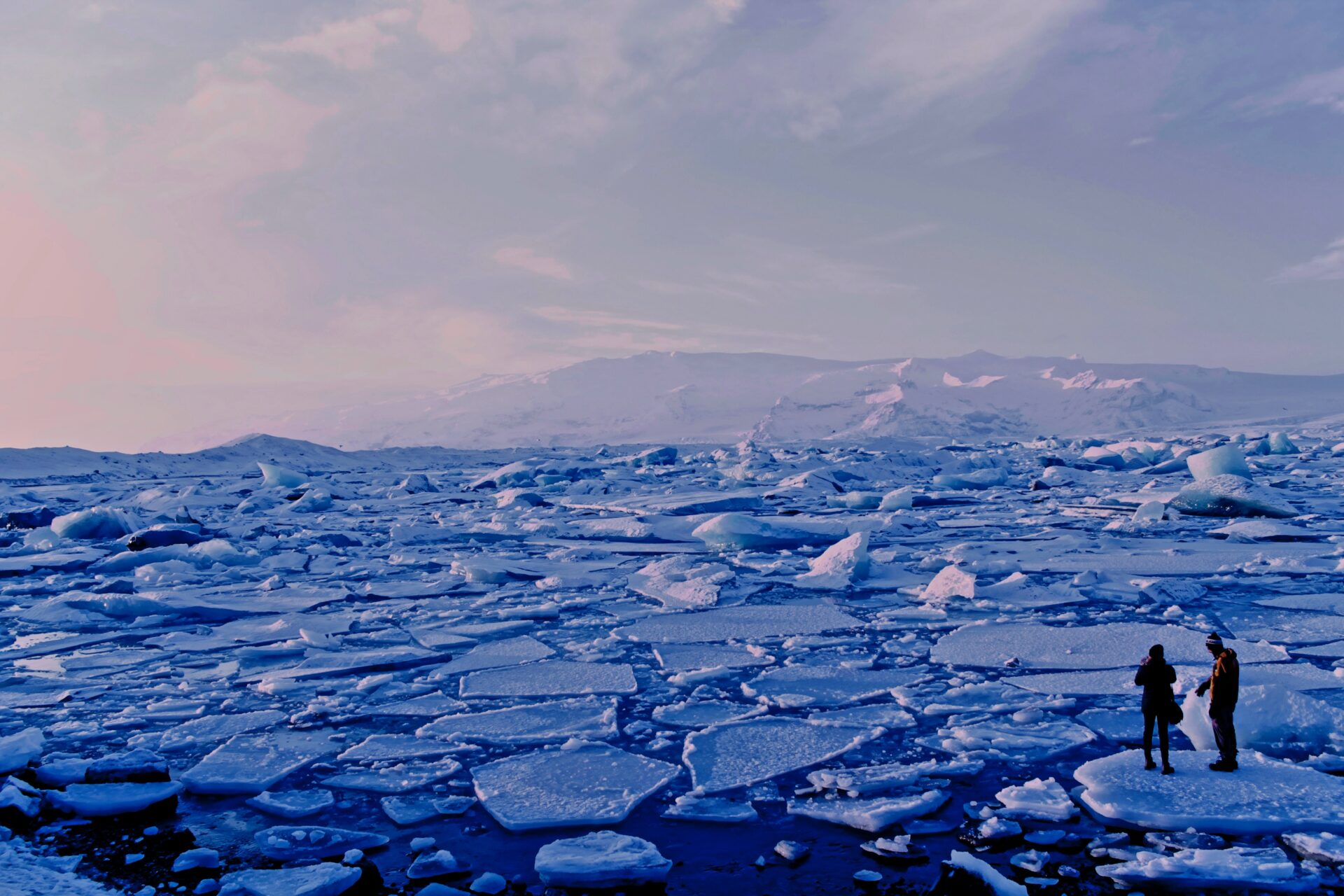
Breaking ice sheets
Photograph by Roxanne Desgagnes via Unsplash
A new year’s prayer for a world on thin ice
January 24, 2024
The highlight of Christmas for me this year was sitting in worship next to my three-year-old and her grandmother while we held candles and sang “Silent Night,” my child’s first direct experience and invitation into the magic of being part of that communal constellation-making moment, holding one of the many lights that shines in the darkness, singing peacefully of the peace that passes all understanding. It felt as if we were in that little stretch of time celebrating the birth of Christ alongside the birth of the cosmos, as much witness as participant in the birthing of love as the birthing of stars. As much “away in a manger,” as “away in a nebula.” As above, so below. It was the balm I needed on a Christmas where the manger scene of baby Jesus in the war-torn rubble in Bethlehem captured the world’s attention, and where, closer to home for us in Wisconsin, Christmas temperatures approached a humid 60 degrees Fahrenheit—near historic highs. This year for us it so happened that Christmas was warmer than Thanksgiving, which was in turn warmer than Halloween, as if the current of the seasons had reversed. Earlier in the service, when we sang “In the Bleak Midwinter,” I pictured the Arctic hares that become easy prey for the lynx when they turn white before the snow comes, a classic example of the type of phenological mismatch and confusion that is spreading in our climate-changed world.
2023 was the hottest year on record. If our eyes are already glazing over when we read something like that, it could be because we’ve heard this one before: the past eight years have been the hottest eight on record. And I’m afraid we’ll be saying the same thing again this year, as a strong El Niño pattern suggests an even warmer 2024. What caught my eye as more striking this year was a headline suggesting that 2023 was the warmest year in the last 125,000 years. 125,000 years ago is considered the most recent “inter-glacial” or “in-between-ice age” period. Scientists think that the oceans were 30 feet higher than they are now—a preview from the past of where things seem for us to be rapidly heading. 125,000 years ago, Neanderthals were hunting large mammals across Europe, while modern Homo sapiens were just beginning to migrate out of Africa. 125,000 years ago, hazel and oak grew above the Arctic Circle in places that are now tundra, and mastodons spent their summers in places that are for now still ice-capped.
What if we set spiritual goals this year to be in a more emotionally intelligent and attuned conversation with the earth? Might we hear the ice melting as tears—the weeping of creation?
After Christmas, I met up with my brother in Northern Wisconsin for a long-planned ice-fishing trip, only to find that there was no safe ice. Around town we heard stories of people so desperate to find hard water that they were venturing out onto the thin ice and falling in. We heard about ice fishing fatalities. We heard about how impossible it was to find an in-stock float suit in any nearby town. We left the tip-ups at home and went birding instead, enjoying the geese and swans and eagles that were themselves enjoying all of the late-season open water.
For far too long now news headlines like “hottest year on record,” have glazed over our eyes, drowned in a cacophony of broken records, and have met indifferent hearts frozen to the plight of the planet. Our hopes and prayers now lie in the wisdom that emotional and spiritual testimony about our climate-changing world can propel us to imagine and live into a more ecologically honoring and elegant way of being human on this planet, more compellingly than scientific data and facts can move us. What if we set spiritual goals this year to be in a more emotionally intelligent and attuned conversation with the earth? Might we hear the ice melting as tears—the weeping of creation? Do we need to become the snowshoe hare ourselves, vulnerable with our very bodies to the climate truth of the moment, that the planet we are all destined to and dependent on is and will be undergoing radical change—change at a geological scale but in the course of lifetimes and decades? Do we need to fall through the thin ice ourselves to wake up to this, the warmest year since the mastodons?
As we move into perhaps another “hottest year on record,” I’ll be taking that moment singing “Silent Night” with my daughter with me, as a reminder that we’ll need to draw upon the best of religious ritual and spiritual experience to guide us, to remind us who and whose we are. We are participants through praise and shapers through action of this wondrous planetary perch in the cosmos—here where in sacred moments we can pray ourselves into remembering that it is not destruction and unraveling but love and beauty that is wanting to be born among us and through us.
Rev. Daniel Cooperrider is a writer, teacher, and pastor in the United Church of Christ (UCC). He was Pastor of the Weybridge Congregational Church (VT) and has served as Pastoral Resident at the Wellesley Village Church (MA). Daniel is the author of Speak with the Earth and It Will Teach You, and a study on the book of Job. Daniel lives on the edge of the driftless region in Madison, WI on ancestral Ho-Chunk land.
The views expressed are those of the author and not necessarily those of American Baptist Home Mission Societies.


